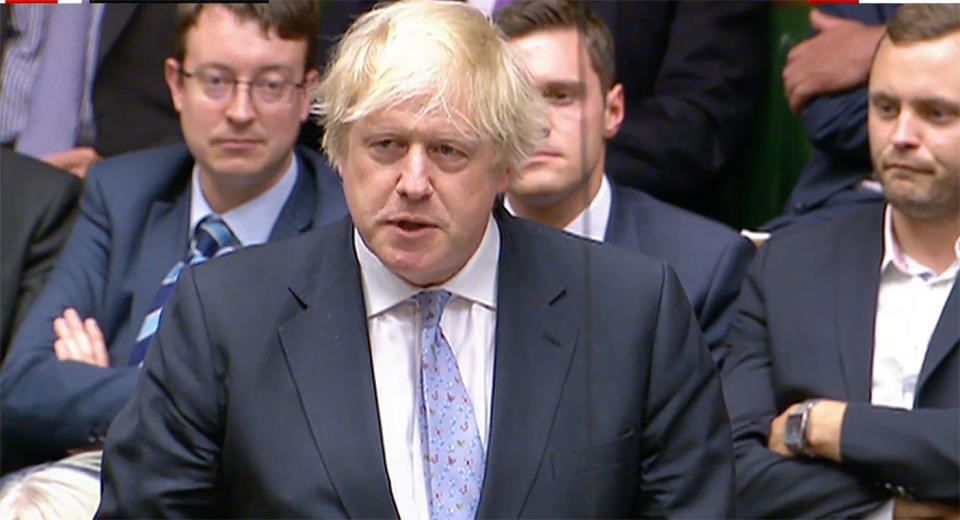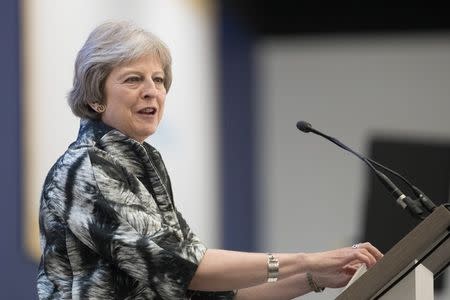Boris Johnson blasts dithering Theresa May and says 'it's not too late to save Brexit'
Boris Johnson has accused Theresa May of leading Britain to democratic disaster over Brexit and allowing a fog of self doubt to get in the way of negotiations.
The former Foreign Secretary, who quit Mrs May’s Cabinet on Monday last week, had been rumoured to want to use his resignation speech to launch a devastating critique of Theresa May’s handling of the negotiations in a move that could have sparked a leadership challenge.
But, instead, Mr Johnson began his speech by praising the prime minister for “her courage and her resilience”.
He said: “It was my privilege to collaborate with her in promoting Global Britain – a vision for this country which she set out with great clarity at Lancaster House last year.”
Mr Johnson said Mrs May made clear then that she would seek a “bold, ambitious and comprehensive” free trade agreement with the EU outside the customs union and single market.’

However, he said that since then, “a fog of self-doubt has descended”.
He told the Commons that the UK was “volunteering for economic vassalage” and that it had “dithered and burned through our negotiating capital”.
He added: “We agreed to hand over a £40 billion exit fee with no discussion of our future economic relationship.”
“It is not too late to save Brexit. We have time in these negotiations. We have changed tack once and we can change again.”
Mr Johnson, who later tweeted out his statement, said that the UK should aim for the vision of “a strong independent, self-governing Britain” set out at Lancaster House, not the “miserable, permanent limbo” of the White Paper presented at Chequers, which has angered so many Brexiteers.
He slammed “the democratic disaster of on-going harmonisation with no way out and no say for the UK.”
Read my personal statement to the House of Commons this afternoon. pic.twitter.com/Zy6klFWQsr
— Boris Johnson (@BorisJohnson) July 18, 2018
Mr Johnson said Mrs May’s Chequers plan amounted to “Brexit in name only” and that he was unable to accept it or support it.
“I’m happy now to be able to speak out,” he said.
Mr Johnson said Britain should be “great independent actors” on the world stage, not “rule takers”.
“That was the vision of Brexit that we fought for,” he said. “That was the vision that the Prime Minister rightly described last year.
“That is the prize that is still attainable. There is time. And, if the Prime Minister can fix that vision once again before us, then I believe she can deliver a great Brexit for Britain with a positive, self-confident approach that will unite this party, unite this House and unite this country as well.”
Mr Johnson’s intervention comes as pressure on the Prime Minister continues to mount.

On Wednesday, a poll gave Labour a five-point lead over the Tories, and a leading Conservative Remainer claimed Brexiteer Jacob Rees-Mogg is running the country – not Mrs May.
The day before, Mrs May thwarted a rebel Tory move which could have forced her to try to keep Britain in a customs union with the EU by 307 votes to 301 – but only after the help of Labour Brexiteers.
But 12 Conservatives broke ranks to back the customs union measure, even though Tory whips told would-be rebels that there would be a confidence vote if it passed, potentially resulting in the collapse of Mrs May’s administration.
Resignation statements have previously been used by former ministers to inflict a departing blow on prime ministers with whom they have clashed.
Sir Geoffrey Howe’s 1990 speech after resigning as deputy prime minister over differences with Margaret Thatcher on Europe was widely regarded as setting in train the process which led to her departure nine days later.
An indication of how precarious Mrs May’s position is came in a YouGov poll for the Times, which put the Conservatives on 36%, down one point from last week, behind Labour on 41%, up two points.

 Yahoo News
Yahoo News 
